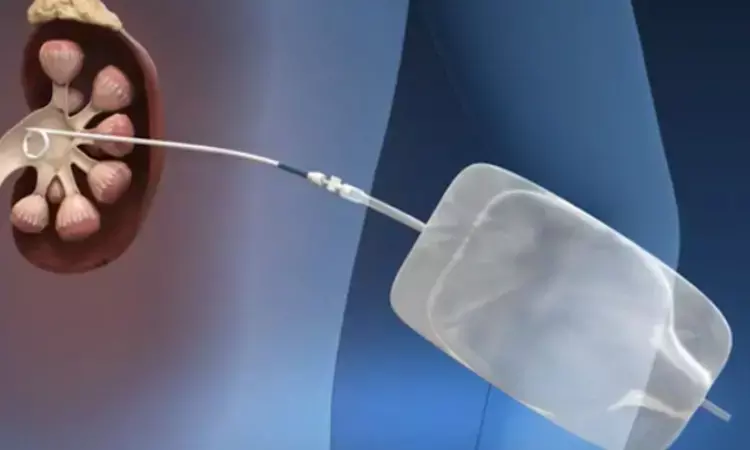- Home
- Medical news & Guidelines
- Anesthesiology
- Cardiology and CTVS
- Critical Care
- Dentistry
- Dermatology
- Diabetes and Endocrinology
- ENT
- Gastroenterology
- Medicine
- Nephrology
- Neurology
- Obstretics-Gynaecology
- Oncology
- Ophthalmology
- Orthopaedics
- Pediatrics-Neonatology
- Psychiatry
- Pulmonology
- Radiology
- Surgery
- Urology
- Laboratory Medicine
- Diet
- Nursing
- Paramedical
- Physiotherapy
- Health news
- Fact Check
- Bone Health Fact Check
- Brain Health Fact Check
- Cancer Related Fact Check
- Child Care Fact Check
- Dental and oral health fact check
- Diabetes and metabolic health fact check
- Diet and Nutrition Fact Check
- Eye and ENT Care Fact Check
- Fitness fact check
- Gut health fact check
- Heart health fact check
- Kidney health fact check
- Medical education fact check
- Men's health fact check
- Respiratory fact check
- Skin and hair care fact check
- Vaccine and Immunization fact check
- Women's health fact check
- AYUSH
- State News
- Andaman and Nicobar Islands
- Andhra Pradesh
- Arunachal Pradesh
- Assam
- Bihar
- Chandigarh
- Chattisgarh
- Dadra and Nagar Haveli
- Daman and Diu
- Delhi
- Goa
- Gujarat
- Haryana
- Himachal Pradesh
- Jammu & Kashmir
- Jharkhand
- Karnataka
- Kerala
- Ladakh
- Lakshadweep
- Madhya Pradesh
- Maharashtra
- Manipur
- Meghalaya
- Mizoram
- Nagaland
- Odisha
- Puducherry
- Punjab
- Rajasthan
- Sikkim
- Tamil Nadu
- Telangana
- Tripura
- Uttar Pradesh
- Uttrakhand
- West Bengal
- Medical Education
- Industry
Mini-PCNL is equally effective as standard PCNL for removing kidney stones: Study

China: Results from a meta-analysis revealed that for patients with proper size renal calculi, Mini Percutaneous Nephrolithotomy (Mini-PCNL) may be a superior option over Standard-PCNL.
The study, published in the journal Urolithiasis showed Mini-PCNL to be at least as effective as Standard-PCNL for renal calculi removal with similar stone-free rates (SFR), postoperative pain, and fever. Further Mini-PCNL was associated with less hemoglobin drop, shorter hospital stay, fewer complications, and greater postoperative tubeless.
Percutaneous nephrolithotomy (PCNL) is the surgical standard for the treatment of large or difficult kidney stones. The European Association of Urology (EAU) definition of Mini-PCNL is a tract size of less than 22 Fr. Presently, many studies have compared Mini-PCNL and Standard-PCNL, but there are some controversies.
Against the above background, Jianhe Liu, The Second Affiliated Hospital of Kunming Medical University, Kunming, NO, China, and colleagues conducted the study with the objective to evaluate the postoperative outcomes of Mini-PCNL and Standard-PCNL in order to determine the optimum option for renal calculi patients.
For this purpose, the researchers searched the online publications between January 2010 and April 2021 in online databases. Based on the criteria for inclusion and exclusion, they chose the literature. Meta-analysis was performed using Review Manager Software (RevMan 5.4.1, Cochrane Collaboration, Oxford, UK) after data retrieval and quality assessment. 20 trials were selected with a total of 4953 people out of 322 studies. 2567 patients were treated with Mini-PCNL and 2386 patients were treated with Standard-PCNL.
Based on the study, the researchers reported the following:
- There was no difference in stone-free rates (SFR), fever, and postoperative pain (VAS score) between Mini-PCNL and Standard-PCNL.
- Patients in the Mini-PCNL group experienced shorter hospital stays, less hemoglobin drop, less blood transfusion, higher postoperative tubeless, and fewer complications including bleeding, perforation, and leakage.
- Operative time was longer in the Mini-PCNL group compared to Standard-PCNL.
The researchers conclude, "Mini-PCNL is at least as effective and safe for the removal of renal calculi as Standard-PCNL with similar SFR and may be a superior option for patients with proper size renal calculi."
Reference:
Wan, C., Wang, D., Xiang, J. et al. Comparison of postoperative outcomes of mini percutaneous nephrolithotomy and standard percutaneous nephrolithotomy: a meta-analysis. Urolithiasis (2022). https://doi.org/10.1007/s00240-022-01349-8
Dr Kamal Kant Kohli-MBBS, DTCD- a chest specialist with more than 30 years of practice and a flair for writing clinical articles, Dr Kamal Kant Kohli joined Medical Dialogues as a Chief Editor of Medical News. Besides writing articles, as an editor, he proofreads and verifies all the medical content published on Medical Dialogues including those coming from journals, studies,medical conferences,guidelines etc. Email: drkohli@medicaldialogues.in. Contact no. 011-43720751


